学术成果篇 | 北京师范大学智慧学习研究院2024年大事记
发布时间:2025-01-27 16:36作者:admin来源:北师大智慧学习研究院点击量:
学术期刊
JOURNAL
JOURNAL
《智慧学习环境》期刊与《计算机教育应用期刊》JCR排名领先
2024年《科睿唯安期刊引证报告》(Journal Citation Reports™️,简称JCR™️)发布,在“教育与教育研究”(Education & Educational Research)领域中共756本期刊参与评选排名。北京师范大学智慧学习研究院参与主办的2本期刊排名领先,其中《智慧学习环境》期刊(Smart Learning Environments, SLE)排名第7,影响因子由去年的4.8提升为6.7,《计算机教育应用期刊》(Journal of Computers in Education, JCE)排名第26,两本期刊均位居教育与教育研究领域前列,覆盖包括SSCI、SCIE、ESCI等在内的索引指标,属于Q1区。
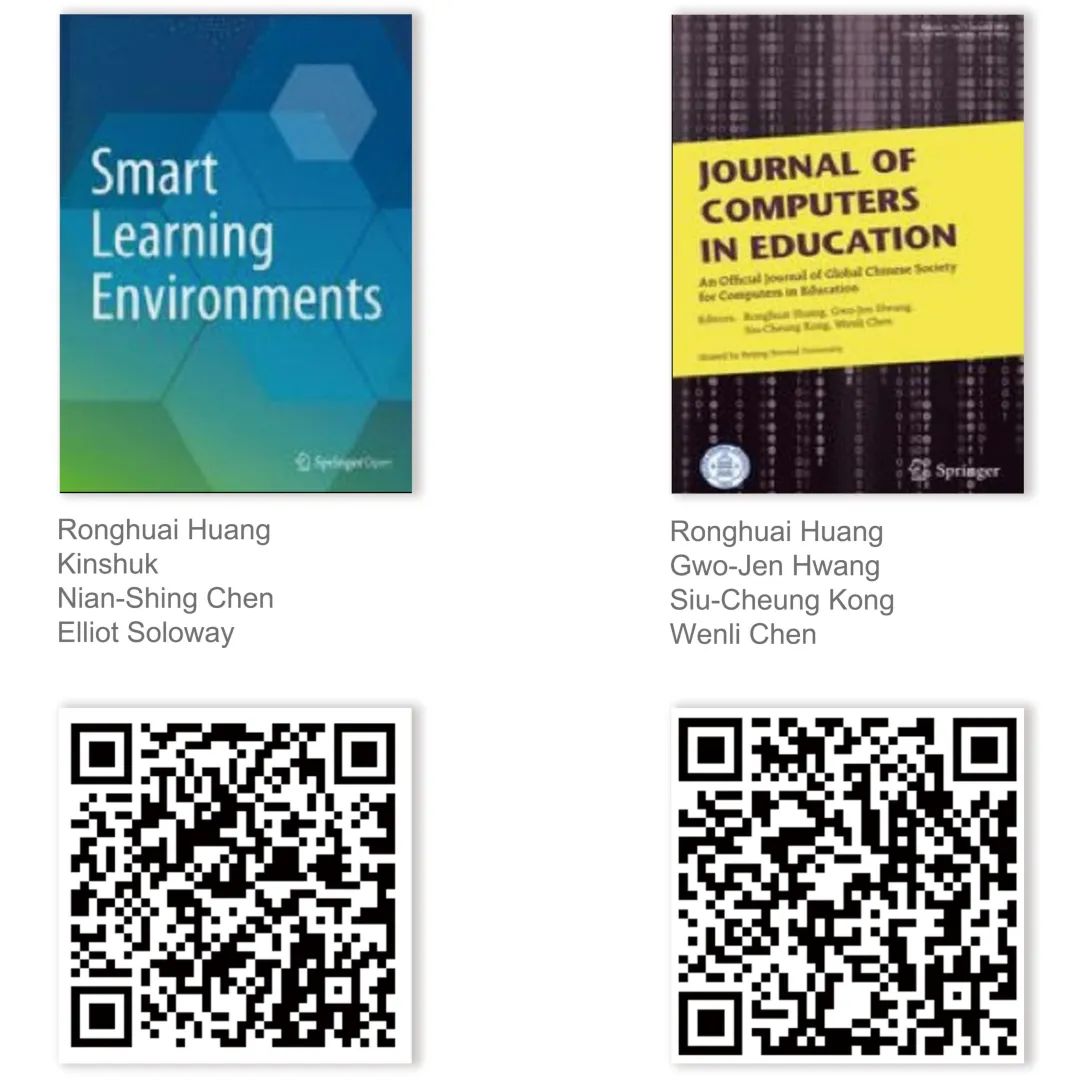
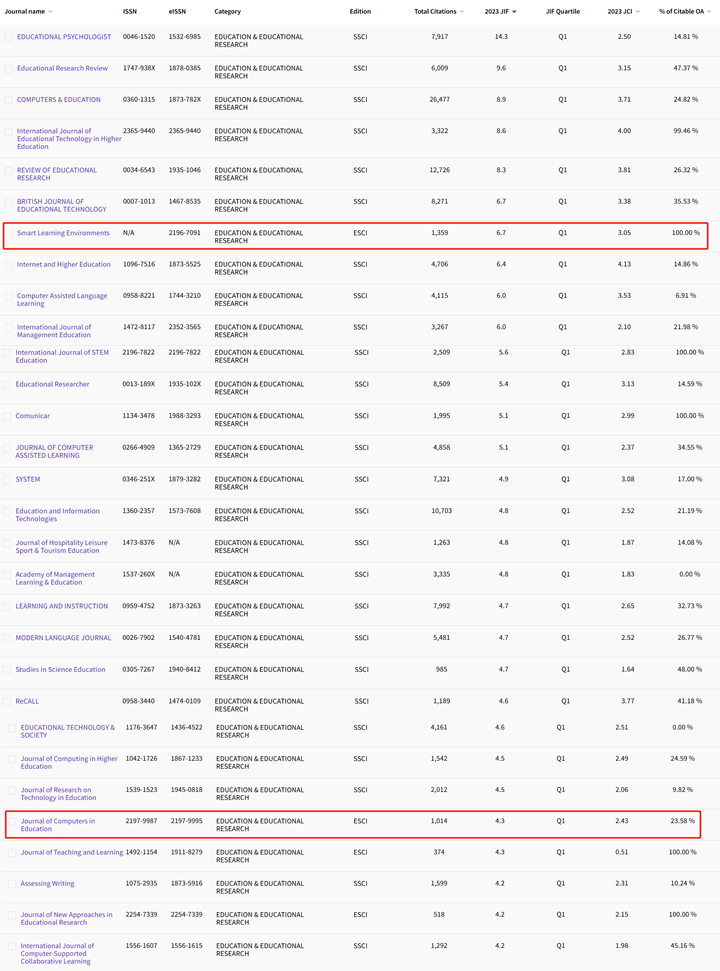
Top 30 Journals in the JCR Rankings for Education & Educational Research
《智慧学习环境》期刊主页:https://slejournal.springeropen.com/
《计算机教育应用期刊》主页:https://link.springer.com/journal/40692
相关阅读
《智慧学习环境》期刊与《计算机教育应用期刊》 在2024年Journal Citation Reports中排名领先
教材
TEXTBOOK
TEXTBOOK
《设计与学习》
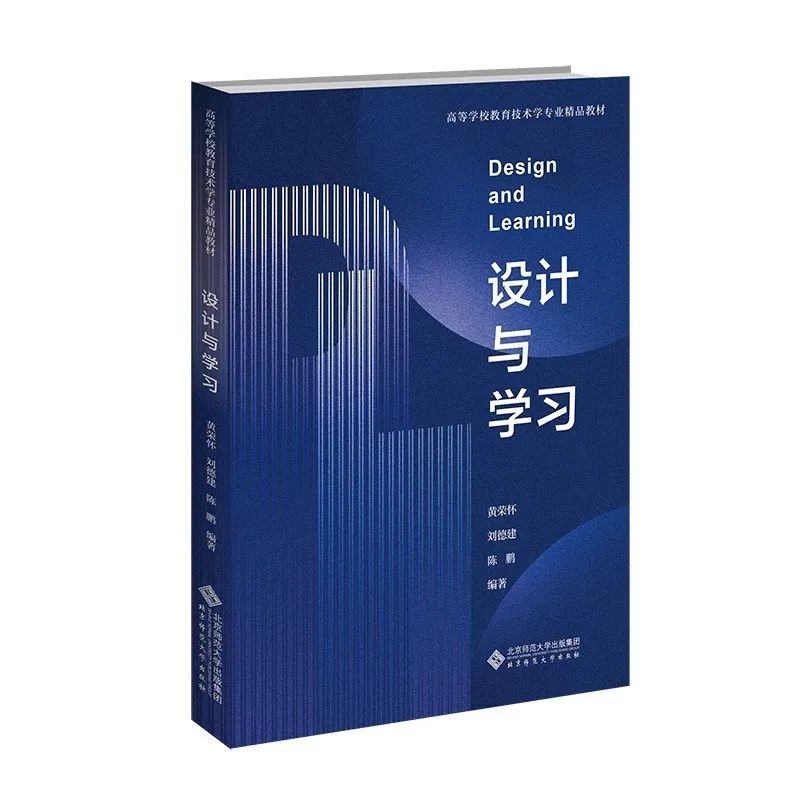
主编:黄荣怀 刘德建 陈鹏
北京师范大学黄荣怀教授、刘德建教授与首都师范大学陈鹏副教授联合编著的高等学校教育技术学专业精品教材——《设计与学习》,核心内容包括“新一轮科技革命与人类社会”、“设计思维的内涵与典型模型”、“NCIP设计方法”、“教学设计与基于设计的学习”、“学习空间与学习方法设计”、“STEAM教育与创客教育”和“未来教育设计议题”等。本书主要面向相关专业的研究生和高年级本科生, 同时也适合教育研究与教育工作者, 以及教育产品设计、技术研发、运维服务等领域对“设计与学习”感兴趣的人员阅读。
本书的特色主要包括五个方面:一、主题新颖。基于科技进步与教育变革对“创新设计”需求的共识,探索将设计思维引入教育领域的途径,开设“设计与学习”课程,并撰写了本教材。二、理论创新。基于国际设计思维的先进理念与典型设计模型,创造性地提出了“NCIP设计方法”(需求—情境—构思—表征),适合教育与学习、工作与生活多场景中的设计活动。三、结构清晰。通过基本概念和拓展阅读两条主线展开,并从版式上对两条主线进行了区分,便于读者产生更好的阅读体验。四、内容丰富。梳理设计思维在关键教育场景中的应用和典型案例,涉及智慧学习环境、教学模式创新、教育制度变革等层面,展示了各种设计活动的理论依据。五、资源多样。与本教材配套的“设计与学习”平台还提供了教育和设计领域的专家讲座、实用的设计工具以及学生的设计作品等。
相关阅读
成果发布|《设计与学习》
Springer丛书
SPRINGER SERIES
SPRINGER SERIES
由黄荣怀院长担任丛书主编的Springer系列丛书New Frontiers of Educational Research,Lecture Notes in Educational Technology,Smart Computing and Intelligence已出版80余册。2024年,研究院团队主编的5本新书出版。
Envisioning the Future of Education Through Design
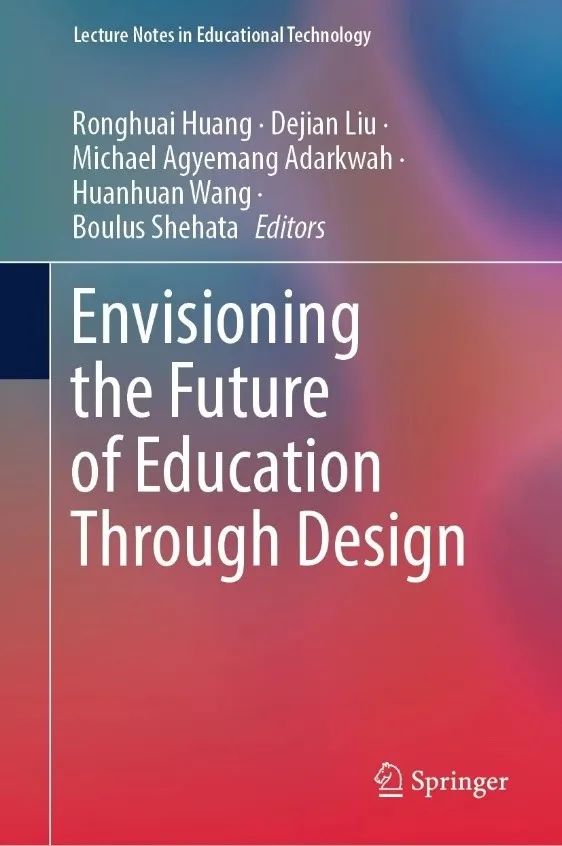
Editors: Ronghuai Huang, Dejian Liu, Michael Agyemang Adarkwah, Huanhuan Wang, Boulus Shehata
北京师范大学智慧学习研究院联席院长黄荣怀教授、联席院长刘德建教授主编的Envisioning the Future of Education Through Design 一书,由国际知名出版社施普林格出版集团(Springer)出版,并收录于Lecture Notes in Educational Technology (LNET) 系列丛书。该著作汇集了7个国家、35位作者的共同智慧,主要探讨了未来教育面临的机遇和挑战,阐述了适用于教育领域的设计方法论,呈现了设计在教育中应用的典型场景和优秀案例,有助于教育领域研究者、管理者、教师和学生等群体使用设计和设计思维来解决教育问题,进而推动未来教育设计迈向“共同利益”。该著作分为未来教育面临的机遇和挑战、适用于教育领域的设计方法论、设计在教育中应用的典型场景和优秀案例三个部分。
相关阅读
成果发布 | Envisioning the Future of Education Through Design
Using Educational Robots to Enhance Learning
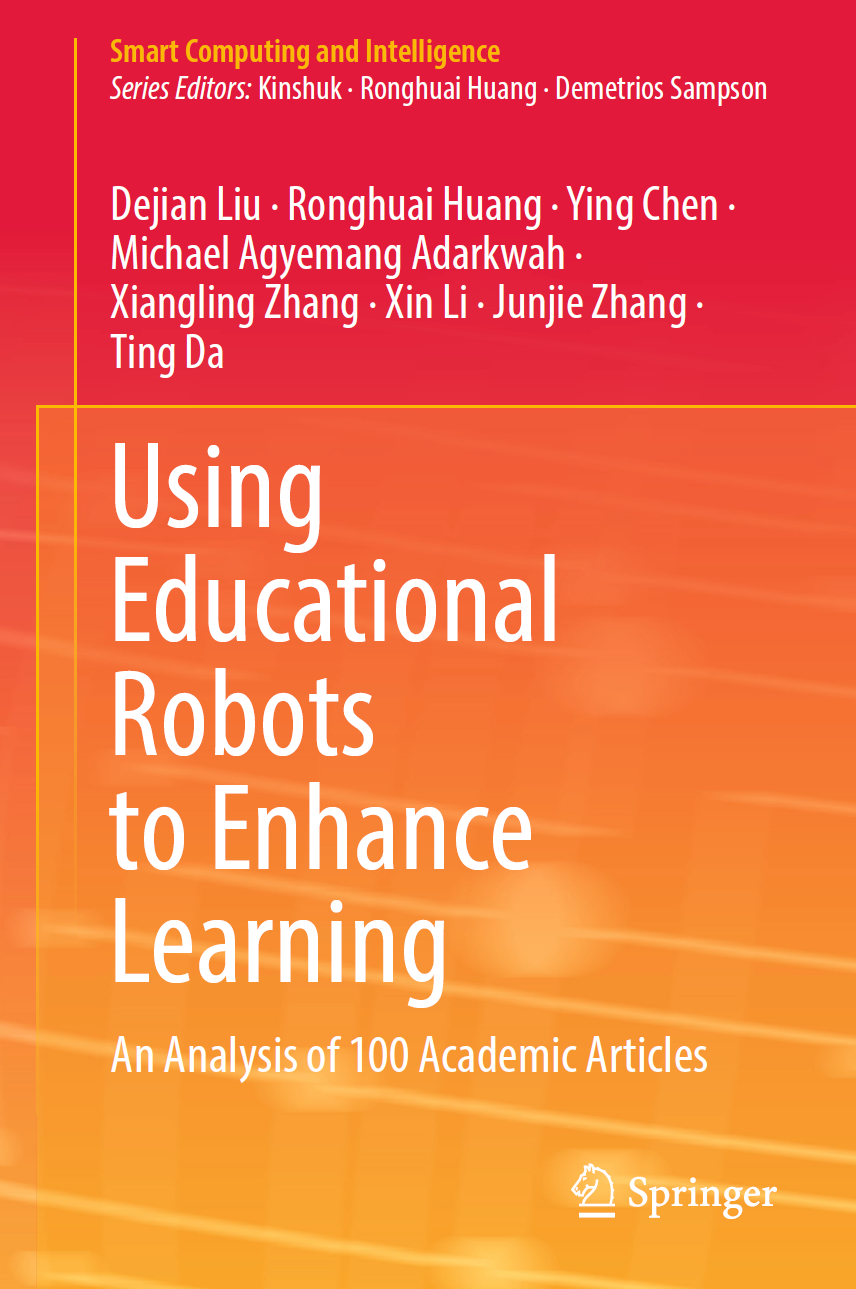
Authors: Dejian Liu, Ronghuai Huang, Ying Chen, Michael Agyemang Adarkwah, Xiangling Zhang, Xin Li, Junjie Zhang, Ting Da
This book presents advances in the research of educational robotics and showcases how they can be used to facilitate learning. It summarizes popular and relevant terms and theories in educational robotics via analyzing one hundred influential journal articles in this field, to provide readers background knowledge on the subject matter. This book also guides readers in understanding how different types of robotics are utilized to promote learning among different types of students, in different contexts, and in different disciplines of study.
相关阅读
New Book Recommendation | Using Educational Robots to Enhance Learning
A Collection of AI Innovations by Chinese Teenagers
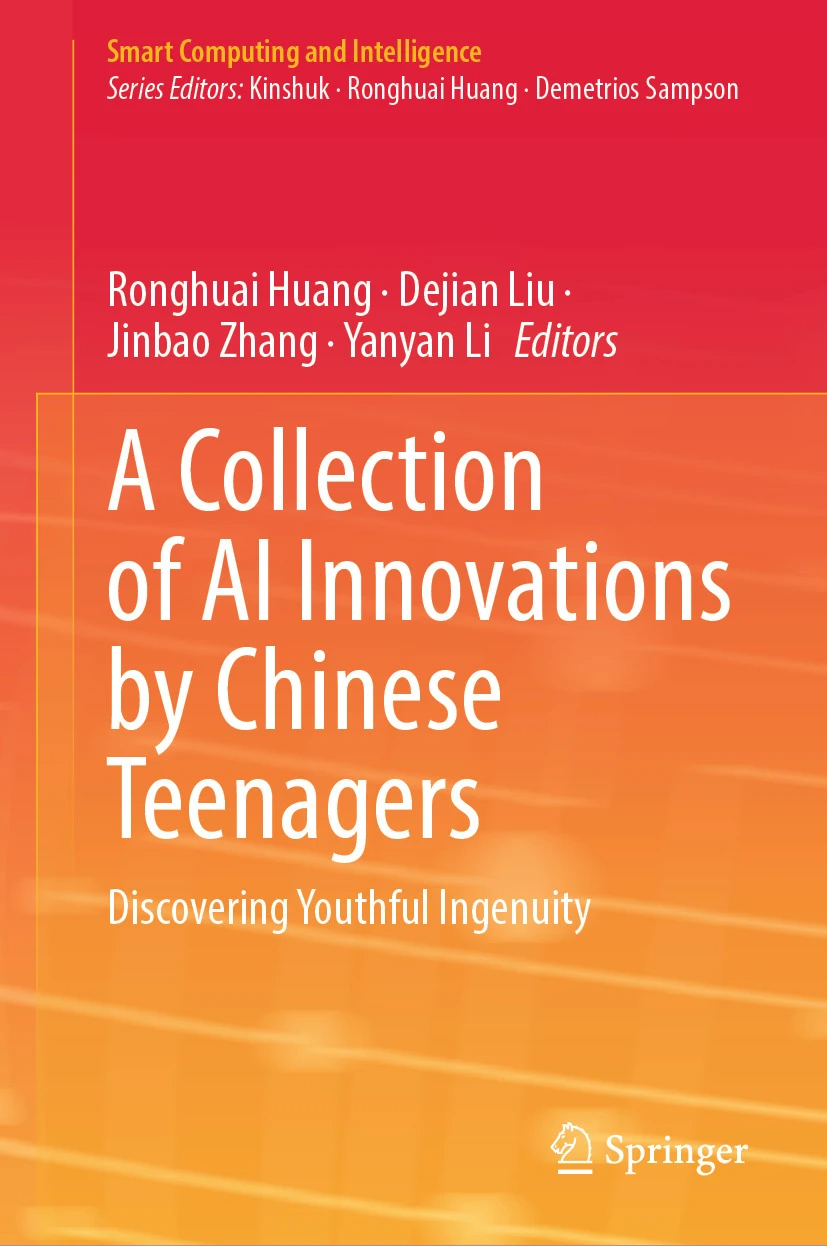
Editors: Ronghuai Huang, Dejian Liu, Jinbao Zhang, Yanyan Li
This book presents 10 artificial intelligence (AI) innovation projects by Chinese teenagers, including innovations on intelligent medical care, environmental protection, education, transportation, among others. It delves into the technical details of these innovations, providing readers with a comprehensive understanding of the concepts and technologies involved in each case. The book also discusses the challenges faced by young innovators and their approaches to overcome them, and serves as a valuable resource for readers interested in the practical applications of AI.
相关阅读
新书推荐 | A Collection of AI Innovations by Chinese Teenagers
Application of the Metaverse in Education
This book presents 10 artificial intelligence (AI) innovation projects by Chinese teenagers, including innovations on intelligent medical care, environmental protection, education, transportation, among others. It delves into the technical details of these innovations, providing readers with a comprehensive understanding of the concepts and technologies involved in each case. The book also discusses the challenges faced by young innovators and their approaches to overcome them, and serves as a valuable resource for readers interested in the practical applications of AI.
相关阅读
新书推荐 | A Collection of AI Innovations by Chinese Teenagers
Application of the Metaverse in Education
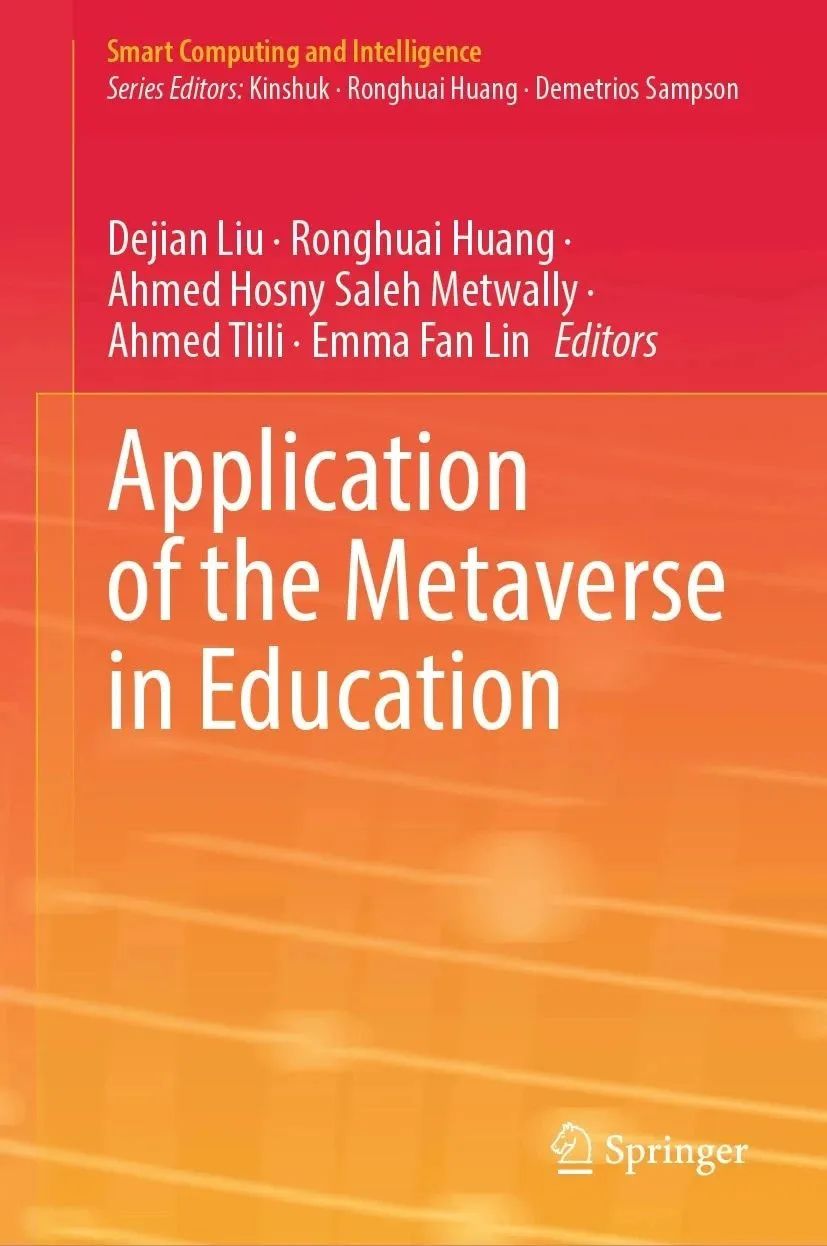
Editors: Dejian Liu, Ronghuai Huang, Ahmed Hosny Saleh Metwally, Ahmed Tlili, Emma Fan Lin
This book covers interesting topics of the metaverse in education. It introduces the metaverse as a new frontier for education and sheds light on broad views about education in the metaverse. It also highlights the design of metaverse world with showing examples of promising immersive environments. Therefore, this book can be of interest to a wide range of stakeholders, such as students, researchers, educators, instructional designers, school administrators, and educational technology specialists.
This book demonstrates the research efforts and best practices for readers where immersive digital experiences meet the pedagogical landscape. It explores the ground-breaking impact of the metaverse on educational practices. The chapters focus on and answer the questions of how researchers and educators apply metaverse applications in education, what the challenges of adopting the metaverse in education are, and what are the future opportunities for promoting the metaverse in education.
相关阅读
New Book Recommendation | Application of the Metaverse in Education
Radical Solutions for Artificial Intelligence and Digital Transformation in Education
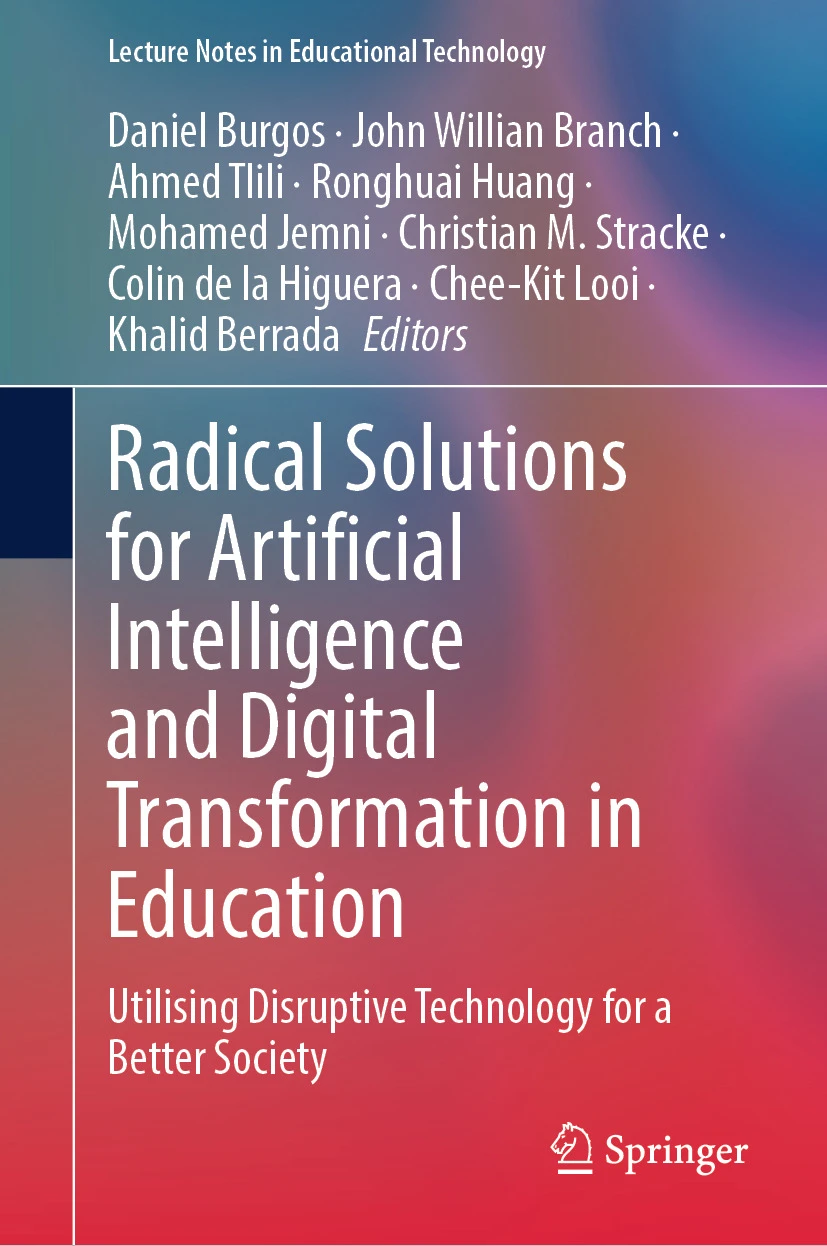
Editors: Daniel Burgos, John Willian Branch, Ahmed Tlili, Ronghuai Huang, Mohamed Jemni, Christian M. Stracke, Colin de la Higuera, Chee-Kit Looi, Khalid Berrada
This book facilitates understanding of how artificial intelligence (AI) aids and integrates digital transformation (DT) in education institutions worldwide in various scenarios: learning environments (learning innovation, learning management systems, data and analytics), emerging education trends (business trends, strategic technologies), administrative systems (recruit, retain, advance, enterprise business capabilities, student information systems), and digital strategy execution (business models and opportunities, strategic planning and governance). It serves as a reference for university lecturers, schoolteachers, policymakers, and international organizations, who will find in its various chapters practical recommendations and discoveries from practice, ready to be implemented in their contexts.
相关阅读
https://link.springer.com/book/10.1007/978-981-97-8638-1
This book facilitates understanding of how artificial intelligence (AI) aids and integrates digital transformation (DT) in education institutions worldwide in various scenarios: learning environments (learning innovation, learning management systems, data and analytics), emerging education trends (business trends, strategic technologies), administrative systems (recruit, retain, advance, enterprise business capabilities, student information systems), and digital strategy execution (business models and opportunities, strategic planning and governance). It serves as a reference for university lecturers, schoolteachers, policymakers, and international organizations, who will find in its various chapters practical recommendations and discoveries from practice, ready to be implemented in their contexts.
相关阅读
https://link.springer.com/book/10.1007/978-981-97-8638-1
智慧教育发展丛书
SMART EDUCATION DEVELOPMENT SERIES
SMART EDUCATION DEVELOPMENT SERIES
2024年,由黄荣怀教授担任主编的“智慧教育发展丛书”出版2册。
《智慧教育访谈录》
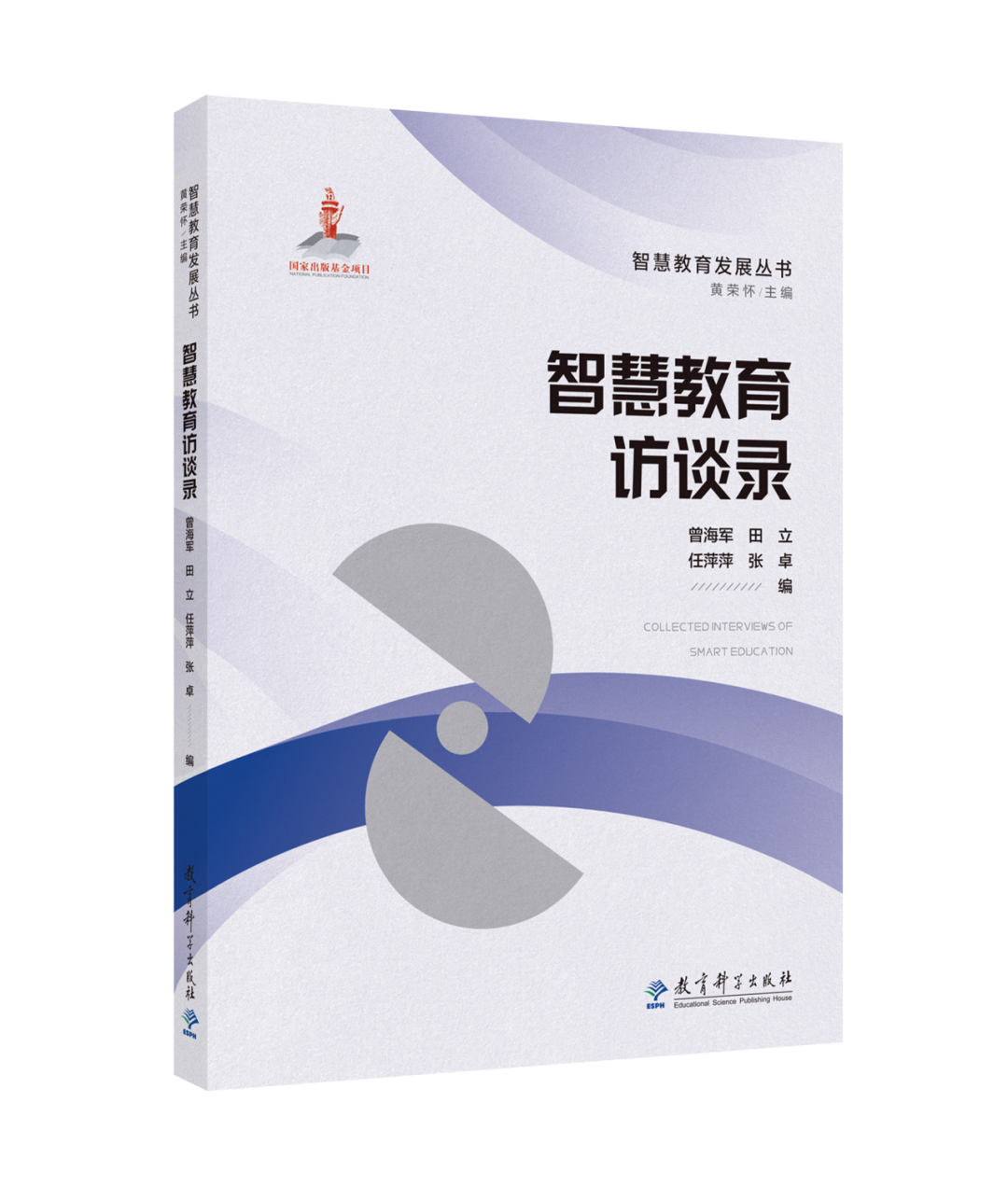
编者:曾海军 田立 任萍萍 张卓
为纵深推进教育数字化战略行动,深入发展智慧教育,加强智慧教育优秀案例传播和经验分享,本书基于《智慧教育大讲堂》访谈节目,围绕教育数字化转型与智慧教育、“互联网+教育”、人工智能与教育等21个访谈主题,通过专家深度对话,探讨可推广的先进经验与优秀案例,探索智慧教育创新发展的可行路径,以形成支撑和引领教育现代化的新途径与新模式。
《区域教育数字化转型的实践探索》
为纵深推进教育数字化战略行动,深入发展智慧教育,加强智慧教育优秀案例传播和经验分享,本书基于《智慧教育大讲堂》访谈节目,围绕教育数字化转型与智慧教育、“互联网+教育”、人工智能与教育等21个访谈主题,通过专家深度对话,探讨可推广的先进经验与优秀案例,探索智慧教育创新发展的可行路径,以形成支撑和引领教育现代化的新途径与新模式。
《区域教育数字化转型的实践探索》
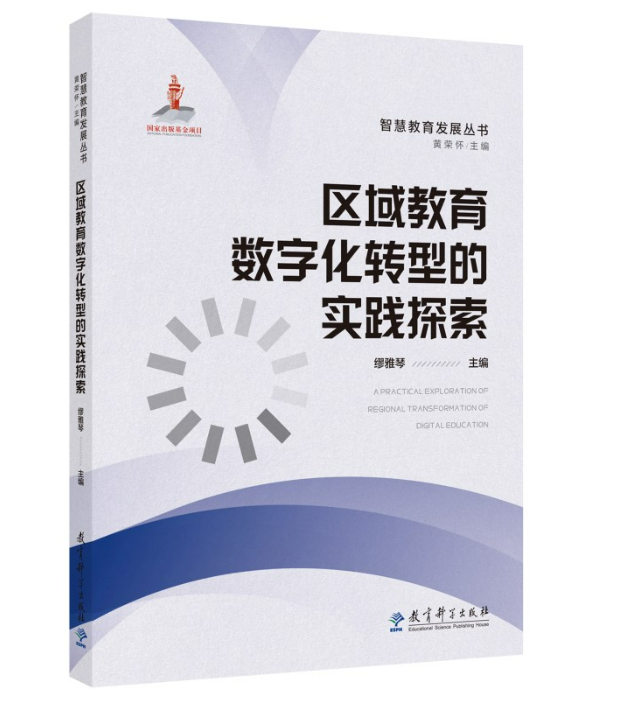
主编:缪雅琴
本书以“教育数字化转型”为主题,系统梳理近年长沙推进智慧教育基础设施建设、教育教学方式改革、教育评价创新、教师培训赋能、教育发展动能转换等方面的做法与经验,为智慧教育理论与基础教育现实的结合搭建了一座稳实的桥梁。本书内容富有新意,智慧教育云平台构建、智慧作业设计、教育评价改革等长沙首创的成果令人耳目一新,数字技术加持下的精准教学、深度学习、智慧“五育”具有强大的实践生命力;推进智慧教育和数字化改革的经验和做法,可以为中小学校开展智慧教育提供借鉴和启发。
智慧学习蓝皮书
BLUE BOOK OF SMART LEARNING
《中国智慧学习研究报告(2024)——智慧学习产品》
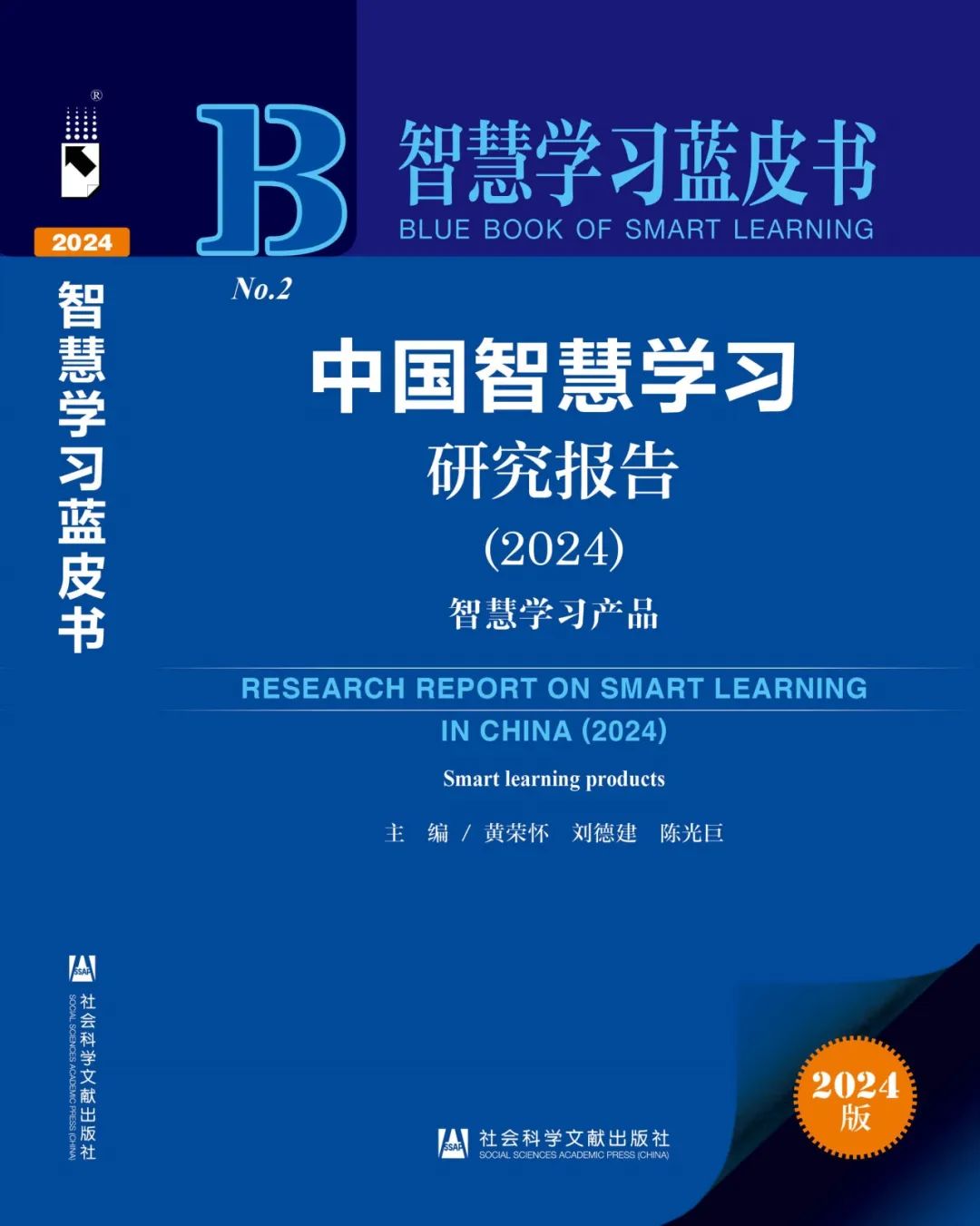
主编:黄荣怀 刘德建 陈光巨
2022年以来,教育部将实施国家教育数字化战略行动作为重要任务来抓,以建设国家智慧教育公共服务平台为重点,全力推进教育数字化转型,扩大平台资源总供给,汇聚部署智能作业、互动课堂、线上教研、辅助阅卷、教育评价等数字教育工具和平台。本书阐述了智慧学习的相关概念和定义,强调智慧学习在智慧社会和数字中国建设和发展中的作用和地位。全书分为总报告、专题篇、地方篇、案例篇四个部分,总结近年来中国智慧学习产品发展的总体情况,通过对智慧学习的内涵、框架与发展环境研究,梳理了不同产品类型的市场现状和发展建议;并且介绍了典型区域、学校在智慧教育的规划、应用和效果展示,展示了区域在应用智慧学习产品实现教育数字化转型的成绩,介绍了典型企业在智慧学习产品的设计思路、架构部署和应用案例,从需求端和供给端来反映技术、产品的应用对于教育数字化转型的现实意义。
研究报告
REPORT
REPORT
“数字转型背景下智慧教育的国际理解”研究报告
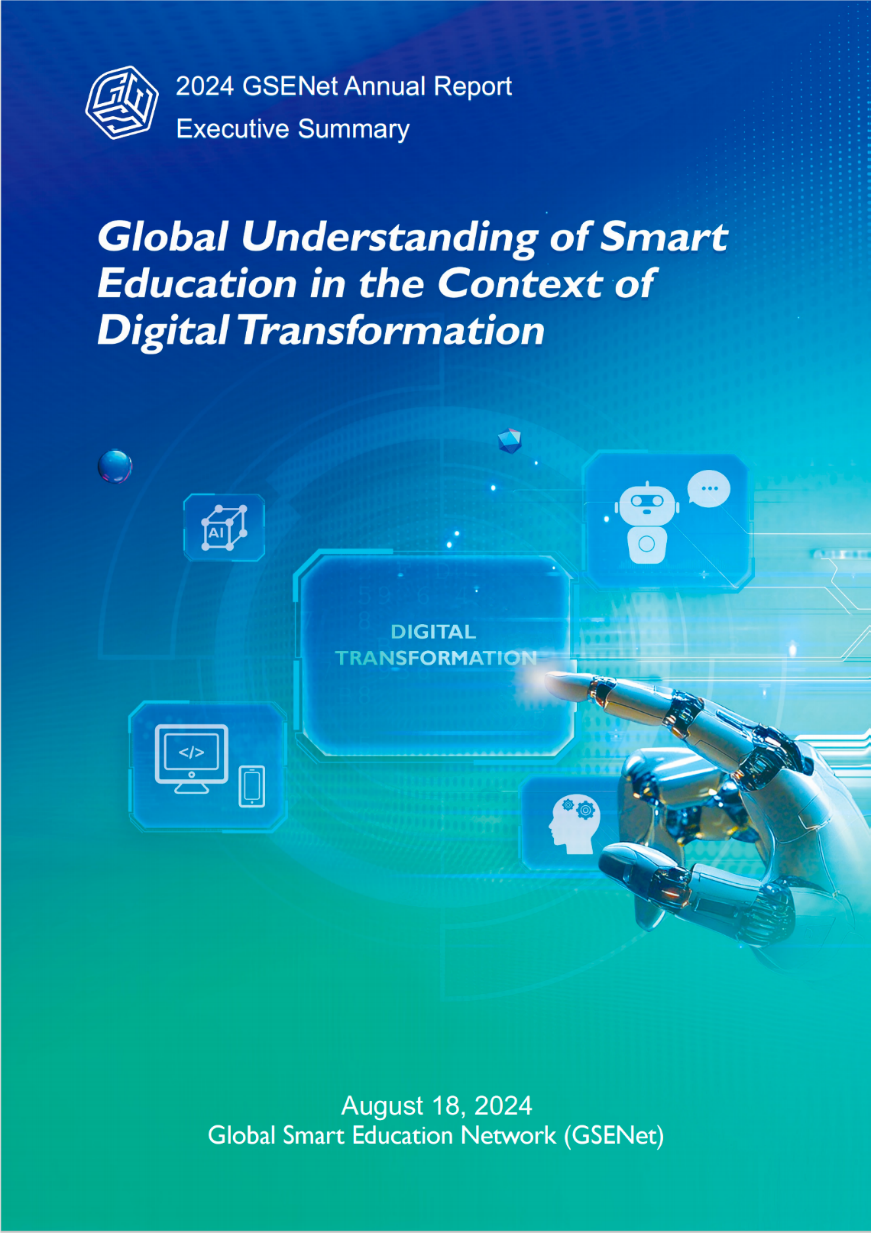
8月18日,在“2024全球智慧教育大会”开幕式暨全体会议上,北京师范大学智慧学习研究院联席院长黄荣怀教授与联合国科教文组织教育信息技术研究所所长展涛教授代表全球智慧教育合作联盟(GSENet)发布了“数字转型背景下智慧教育的国际理解”研究报告(Global Understanding of Smart Education in the Context of Digital Transformation)。
相关阅读
“数字转型背景下智慧教育的国际理解”研究报告发布
"Digital Pedagogy Framework for Sustainable Education: Putting the learner at the centre"
“数字转型背景下智慧教育的国际理解”研究报告发布
"Digital Pedagogy Framework for Sustainable Education: Putting the learner at the centre"
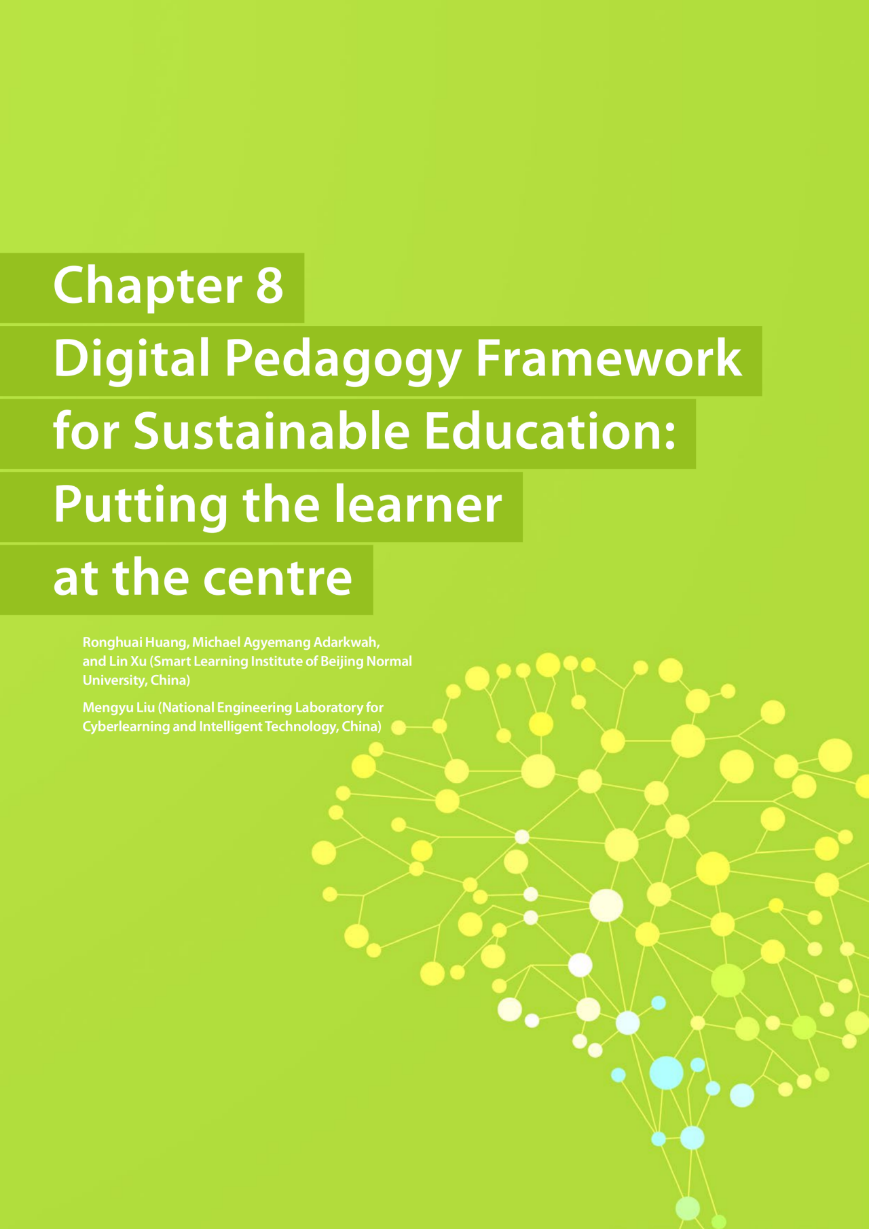
2024年12月2日,联合国教科文组织发布《来自学习科学的教育洞见:利用科学知识推动教学和学习的创新》(Insights from the science of learning for education: Leveraging scientific knowledge for innovations in teaching and learning)报告。报告收录了北京师范大学智慧学习研究院、联合国教科文组织人工智能与教育教席团队题为"Digital Pedagogy Framework for Sustainable Education: Putting the learner at the centre"的政策摘要。
相关阅读
倡导数字教学法,推动智能时代全域教育变革——联合国教科文报告收录黄荣怀教授政策摘要
《2024中国教育技术产业研究报告》

2024年12月21日,中国教育技术协会学术委员会主任、北京师范大学智慧学习研究院联席院长黄荣怀在第七届教育技术发展与应用大会暨成果展览会开幕式发布年度研究成果《2024中国教育技术产业研究报告》,从教育强国、数字经济、数字产业和数字社会视角,以更宏观的视野、更具包容性的研究框架,关注教育科技人才体制机制一体改革,以教育技术产业创新发展筑教育新基建,推进国家教育数字化战略,首次对教育技术产业,从内涵边界、历史沿革、技术革新、教学应用等层面做了全景式扫描。
相关阅读
《2024中国教育技术产业研究报告》发布
论文
PAPER
PAPER
[1] Tlili, A., Altinay, F., Huang, R., Bozkurt, A., Burgos, D., Shehata, B., Altinay, Z., Wang, H., & Sani-Bozkurt, S. (2024). Trends of artificial intelligence in special education and their relation to the sustainable development goals: Where are we now and where are we heading? In Lecture notes in educational technology (pp. 27–45). https://doi.org/10.1007/978-981-97-8638-1_3
[2] Huang, R., Wang, H., Tlili, A., Liu, J., Li, M., & Chang, T. (2024). Leveraging AI in education powered by intelligent social experiment. In Lecture notes in educational technology (pp. 77–96). https://doi.org/10.1007/978-981-97-8638-1_6
[3] Huang, R., Adarkwah, M. A., Liu, M., Hu, Y., Zhuang, R., & Chang, T. (2024). Digital Pedagogy for Sustainable Education Transformation: Enhancing Learner-Centred Learning in the Digital Era. Frontiers of Digital Education (pp.1-16). https://doi.org/10.1007/s44366-024-0031-x
[4] Mustafa, M. Y., Tlili, A., Lampropoulos, G., Huang, R., Jandrić, P., Zhao, J., Salha, S., Xu, L., Panda, S., Kinshuk, N., López-Pernas, S., & Saqr, M. (2024). A systematic review of literature reviews on artificial intelligence in education (AIED): a roadmap to a future research agenda. Smart Learning Environments, 11(1). https://doi.org/10.1186/s40561-024-00350-5
[5] Othman, A., Chemnad, K., Tlili, A., Da, T., Wang, H., & Huang, R. (2024). Comparative analysis of GPT-4, Gemini, and Ernie as gloss sign language translators in special education. Discover Global Society, 2(1). https://doi.org/10.1007/s44282-024-00113-0
[6] Huang, R., Liu, D., Kanwar, A. S., Zhan, T., Yang, J., Zhuang, R., Liu, M., Li, Z., & Adarkwah, M. A. (2024). Global understanding of smart education in the context of digital Transformation. Open Praxis, 16(4), 663–676. https://doi.org/10.55982/openpraxis.16.4.761
[7] Shehata, B., Tlili, A., Huang, R., Hodges, C. B., & Kanwar, A. (2024). Implications and Challenges of technology adoption in Education: A 20-Year Analysis of Horizon Reports. TechTrends. 1-14 https://doi.org/10.1007/s11528-024-01027-z
[8] Liu, D., Huang, R., Chen, Y., Adarkwah, M. A., Zhang, X., Li, X., Zhang, J., & Da, T. (2024). Robot-Based practices in programming. In Smart computing and intelligence (pp. 105–122). https://doi.org/10.1007/978-981-97-5826-5_6
[9] Liu, D., Huang, R., Chen, Y., Adarkwah, M. A., Zhang, X., Li, X., Zhang, J., & Da, T. (2024b). Robotics-Based cognitive training for the senior people. In Smart computing and intelligence (pp. 167–179). https://doi.org/10.1007/978-981-97-5826-5_10
[10] Liu, D., Huang, R., Chen, Y., Adarkwah, M. A., Zhang, X., Li, X., Zhang, J., & Da, T. (2024a). Preface: Embracing a new era: facilitating teaching and learning through robotics. In Smart computing and intelligence (pp. 1–7). https://doi.org/10.1007/978-981-97-5826-5_1
[11] Liu, D., Huang, R., Chen, Y., Adarkwah, M. A., Zhang, X., Li, X., Zhang, J., & Da, T. (2024b). Reading guidelines of this handbook. In Smart computing and intelligence (pp. 9–13). https://doi.org/10.1007/978-981-97-5826-5_2
[12] Liu, D., Huang, R., Chen, Y., Adarkwah, M. A., Zhang, X., Li, X., Zhang, J., & Da, T. (2024a). Language Learning with Social Robots. In Smart computing and intelligence (pp. 123–133). https://doi.org/10.1007/978-981-97-5826-5_7
[13] Liu, D., Huang, R., Chen, Y., Adarkwah, M. A., Zhang, X., Li, X., Zhang, J., & Da, T. (2024f). Teaching with Robotics in Classroom. In Smart computing and intelligence (pp. 135–154). https://doi.org/10.1007/978-981-97-5826-5_8
[14] Liu, D., Huang, R., Chen, Y., Adarkwah, M. A., Zhang, X., Li, X., Zhang, J., & Da, T. (2024d). Requirement Analysis from Key Stakeholders. In Smart computing and intelligence (pp. 181–221). https://doi.org/10.1007/978-981-97-5826-5_11
[15] Liu, D., Huang, R., Chen, Y., Adarkwah, M. A., Zhang, X., Li, X., Zhang, J., & Da, T. (2024e). Robot-Assisted special education. In Smart computing and intelligence (pp. 155–165). https://doi.org/10.1007/978-981-97-5826-5_9
[16] Liu, D., Huang, R., Chen, Y., Adarkwah, M. A., Zhang, X., Li, X., Zhang, J., & Da, T. (2024g). Robotics in STEM education. In Smart computing and intelligence (pp. 87–104). https://doi.org/10.1007/978-981-97-5826-5_5
[17] Liu, D., Huang, R., Chen, Y., Adarkwah, M. A., Zhang, X., Li, X., Zhang, J., & Da, T. (2024c). Personalized tutoring through conversational agents. In Smart computing and intelligence (pp. 59–85). https://doi.org/10.1007/978-981-97-5826-5_4
[18] Liu, D., Huang, R., Chen, Y., Adarkwah, M. A., Zhang, X., Li, X., Zhang, J., & Da, T. (2024a). Background material necessary for the effective use of this book. In Smart computing and intelligence (pp. 15–57). https://doi.org/10.1007/978-981-97-5826-5_3
[19] Zhang, X., Tlili, A., Hu, S., Yu, X., & Huang, R. (2024). Technology integration in compulsory education in China: Insights from the latest Chinese National Curriculum Standards. IEEE, 277–279. https://doi.org/10.1109/icalt61570.2024.00087
[20] Tlili, A., Salha, S., Wang, H., Huang, R., Rudolph, J., & Weidong, R. (2024). Does personalization really help in improving learning achievement? A meta-analysis. IEEE, 37, 13–17. https://doi.org/10.1109/icalt61570.2024.00011
[21] Tlili, A., Denden, M., Abed, M., & Huang, R. (2024). Artificial intelligence ethics in services: are we paying attention to that?! Service Industries Journal, 1–24. https://doi.org/10.1080/02642069.2024.2369322
[22] Metwally, A. H. S., Huang, R., Palomino, P. T., & Yousef, A. M. F. (2024). The effect of micro gamified online homework on gameful experience, intrinsic motivation, engagement, and cognitive load. Education and Information Technologies. 1-35 https://doi.org/10.1007/s10639-024-12750-8
[23] Metwally, A. H. S., Tlili, A., Wang, Y., Li, Z., Zhao, J., Shehata, B., Yang, D., & Huang, R. (2024). How do Chinese and Egyptian science textbooks differ? A cross-country comparative research. Heliyon, 10(12), e32380. https://doi.org/10.1016/j.heliyon.2024.e32380
[24] Tlili, A., Zhao, J., Yang, K., Wang, Y., Bozkurt, A., Huang, R., Bonk, C. J., & Ashraf, M. A. (2024). Going beyond books to using e-books in education: a systematic literature review of empirical studies. Interactive Learning Environments, 2207-2231. https://doi.org/10.1080/10494820.2022.2141786
[25] Huang, R., Yang, J., Xiao, G., & Zhang, H. (2024). Computational thinking and the new curriculum standards of information technology for senior high schools in China. In The MIT Press eBooks (pp. 71–84). https://doi.org/10.7551/mitpress/14041.003.0007
[26] Metwally, A. H. S., Tlili, A., Chang, T., Liu, D., Lin, E. F., & Huang, R. (2024). Application of the metaverse in Education: hotspots, challenges and future directions. In Smart computing and intelligence (pp. 155–162). https://doi.org/10.1007/978-981-97-1298-4_9
[27] Altinay, F., Tlili, A., Altinay, Z., Dagli, G., Adedoyin, O. B., Huang, R., Xu, L., Jemni, M., Mogavi, R. H., & Metwally, A. H. S. (2024). Meta-In or Meta-Out of Students with Special Needs: A Systematic Review on the Use of Metaverse in Special Education. Smart Computing and Intelligence, 111–128. https://doi.org/10.1007/978-981-97-1298-4_7
[28] Adarkwah, M. A., Odame, J., Huang, R., Wang, H., & Amoako, P. Y. O. (2024). Smart teaching versus hard teaching: Insights from instructors from old and new classrooms in Ghana. E-Learning and Digital Media. https://doi.org/10.1177/20427530241251412
[29] Tlili, A., Adarkwah, M. A., Salha, S., & Huang, R. (2024). How environmental perception affects players’ in-game behaviors? Towards developing games in compliance with sustainable development goals. Entertainment Computing, 50, 100678. https://doi.org/10.1016/j.entcom.2024.100678
[30] Shehata, B., Tlili, A., Huang, R., Adarkwah, M. A., Liu, M., & Chang, T. (2024). How are we doing with student-centered learning facilitated by educational technologies? A systematic review of literature reviews. Education and Information Technologies, 29(7), 7813–7854. https://doi.org/10.1007/s10639-023-12112-w
[31] Ronghuai Huang, Editor, Dejian Liu, Editor, Michael Agyemang Adarkwah, Editor, Huanhuan Wang, Editor, & Boulus Shehata, Editor. (2024, April 11). Envisioning the Future of Education through Design. Lecture Notes in Educational Technology. https://eric.ed.gov/?id=ED658712
[32] Adarkwah, M. A., Tlili, A., Shehata, B., Huang, R., Amoako, P. Y. O., & Wang, H. (2024). ChatGPT implementation in the metaverse: towards another level of immersiveness in education. In Springer eBooks (pp. 421–436). https://doi.org/10.1007/978-3-031-46238-2_21
[33] Endris, A., Tlili, A., Huang, R., Xu, L., Chang, T., & Mishra, S. (2024). Features, Components and Processes of Developing Policy for Artificial Intelligence in Education (AIED): Toward a Sustainable AIED Development and Adoption. Leadership and Policy in Schools, 1–9. https://doi.org/10.1080/15700763.2024.2312999
[34] Tlili, A., Adarkwah, M. A., Lo, C. K., Bozkurt, A., Burgos, D., Bonk, C. J., Costello, E., Mishra, S., Stracke, C. M., & Huang, R. (n.d.). Taming the Monster: How can Open Education promote the effective and safe use of generative AI in education?. https://eric.ed.gov/?id=EJ1449732
[35] Shehata, B., Tlili, A., Sampson, D. G., & Huang, R. (2024). Is it Time to Consider Biomimetics for Sustainable Education? Lessons from the Nature for “Smarter” Learning Environments. In Cognition and exploratory learning in the digital age (pp. 247–270). https://doi.org/10.1007/978-3-031-54207-7_14
[36] Tlili, A*. (2024). Can artificial intelligence (AI) help in computer science education? A meta-analysis approach. Revista Española de Pedagogía, 82 (289).
[37] Tlili, A., Salha, S., Garzón, J., Denden, M., Kinshuk, Affouneh, S., & Burgos, D. (2024). Which pedagogical approaches are more effective in mobile learning? A meta‐analysis and research synthesis. Journal of Computer Assisted Learning, 40(3), 1321-1346.
[38] Qiang, W., & Yuzhong, Y. (2024). Exploring new paths for the internationalization of vocational colleges in the era of artificial intelligence. Journal of Curriculum and Teaching, 13(5), 103. https://doi.org/10.5430/jct.v13n5p103
[39] Oubibi, M. (2023d). An experimental study to promote preservice teachers’ competencies in the classroom based on teaching-learning model and Moso Teach. Education and Information Technologies, 29(6), 6631–6650. https://doi.org/10.1007/s10639-023-12070-3
[40] Oubibi, M., & Hryshayeva, K. (2024b). Effects of virtual reality technology on primary school students’ creativity performance, learning engagement and mental flow. Education and Information Technologies 29, 22609–22628. https://doi.org/10.1007/s10639-024-12766-0
[41] Oubibi, M., Fute, A., Kangwa, D., Barakabitze, A. A., & Adarkwah, M. A. (2024). Interactive Technologies in Online Teacher Education in Africa: A Systematic Review 2014–2024. Education Sciences, 14(11), 1188. https://doi.org/10.3390/educsci14111188
[42] Oubibi, M., Fute, A., & Saleem, A. (2024). The attitude of students toward digital and sustainable pedagogies in training with technology. International Journal of Smart Technology and Learning, 4(1), 32–47. https://doi.org/10.1504/ijsmarttl.2024.142176
[43] M. Oubibi, T. Liu and A. H. Saleh Metwally.(2024).Designing and Developing Online Learning Activities for Adult Learners through Integration with an Open University Platform. IEEE International Conference on Advanced Learning Technologies (ICALT), Nicosia, North Cyprus, Cyprus, 2024, pp. 29-33, doi: 10.1109/ICALT61570.2024.00015
[44] Bichoualne, A., Oubibi, M., & Rong, Y. (2023). The impact of mental health literacy intervention on in-service teachers’ knowledge attitude and self-efficacy. Cambridge Prisms Global Mental Health, 10. https://doi.org/10.1017/gmh.2023.77
[45] An, Z., Ge, J., Xu, Y., Liang, X., Zhang, J., & Oubibi, M. (2023). Exploring the mediating effect of creativity on the relationship between family capital and academic achievement in geography. Scientific Reports, 13(1). https://doi.org/10.1038/s41598-023-48833-8
[46] Fute, A., Oubibi, M., & Kangwa, D. (2024). Exploring the influence of family socio-cultural factors on students’ learning engagement at school through a mediation model. Journal of Human Behavior in the Social Environment, 1–16. https://doi.org/10.1080/10911359.2024.2302518
[47] Fute, A., Kangwa, D., & Oubibi, M. (2023). Media Illiteracy and its Implications on Sexual permissiveness and Unrealistic Couple Goals among University Students in Tanzania. Journal of Human Behavior in the Social Environment, 34(7), 1056–1074. https://doi.org/10.1080/10911359.2023.2234963
[48] Fute, A., Mushi, B. R., Kangwa, D., & Oubibi, M. (2024). Combating youth’s unemployment rate by integrating entrepreneurship in middle school education. Discover Education, 3(1). https://doi.org/10.1007/s44217-024-00124-8
[49] Wu, S., Oubibi, M., & Bao, K. (2024). How supervisors affect students’ academic gains and research ability: An investigation through a qualitative study. Heliyon, 10(10), e31079. https://doi.org/10.1016/j.heliyon.2024.e31079
[50] Fute, A., Oubibi, M., Sun, B., Zhou, Y., Bassiri, M., & Chen, G. (2024). Parenting for Success: exploring the link between parenting styles and adolescents’ academic achievement through their learning engagement. SAGE Open, 14(2). https://doi.org/10.1177/21582440241255176
[51] Zhao, W., Shi, X., Jin, M., Li, Y., Liang, C., Ji, Y., Cao, J., Oubibi, M., Li, X., & Tian, Y. (2024). The impact of a growth mindset on high school students’ learning subjective well-being: the serial mediation role of achievement motivation and grit. Frontiers in Psychology, 15. https://doi.org/10.3389/fpsyg.2024.1399343
[52] Nahli, A., Li, D., Uddin, R., Irfan, M., Oubibi, M., Lu, Q., & Zhang, J. Q. (2024). ExposureNet: Mobile camera exposure parameters autonomous control for blur effect prevention. IET Image Processing, 18(12), 3403–3414. https://doi.org/10.1049/ipr2.13182
[53] Er-Rida, S., Zaidouni, A., Mafhoum, M., Oubibi, M., Alami, M. H., & Alaoui, A. M. (2024). Inclusive Education: Exploring Parental Aspirations for Children with Down Syndrome in Regular Schools. The Open Psychology Journal, 17(1). https://doi.org/10.2174/0118743501311174240906104333
[54] Li, Y., Tian, Y., Zhao, W., Oubibi, M., & Ding, Y. (2024). Teaching in China’s Heartland: A Qualitative exploration of rural teacher job satisfaction. Heliyon, 10(18), e38092. https://doi.org/10.1016/j.heliyon.2024.e38092
[55] Bao, K., Wu, S., Oubibi, M., & Cai, L. (2024). Chinese rural Children’s video game Disorder: Processes, harms and causes. Research Square (Research Square). https://doi.org/10.21203/rs.3.rs-5101383/v1
[56] AlGerafi, M. a. M., Zhou, Y., Oubibi, M., & Wijaya, T. T. (2023). Unlocking the potential: A comprehensive evaluation of augmented reality and virtual reality in education. Electronics, 12(18), 3953. https://doi.org/10.3390/electronics12183953
[57] Fute, A., Wan, X., & Oubibi, M. (2023). A historical review of global efforts on adult literacy education, with particular reference to Tanzania. International Review of Education, 69(3), 327–350. https://doi.org/10.1007/s11159-023-10019-9
[58] Shehata, B. (2024). Design of Future Classrooms: A review of learning space designs and learning methods. Lecture Notes in Educational Technology, 245–266. https://doi.org/10.1007/978-981-97-0076-9_11
[59] Shehata, B., Tlili, A., & Huang, R. (2021). An Analysis of International Conference Proceedings on Artificial General Intelligence (AGI) from 2008 to 2020: A Data-Mining Mapping Analysis. 8th International Conf on ICT & Accessibility (ICTA), Tunis, Tunisia, 1–6. https://doi.org/10.1109/icta54582.2021.9809429
[60] Tlili, A., Shehata, B., Adarkwah, M. A., Bozkurt, A., Hickey, D. T., Huang, R., & Agyemang, B. (2023). What if the devil is my guardian angel: ChatGPT as a case study of using chatbots in education. Smart Learning Environments, 10(1). https://doi.org/10.1186/s40561-023-00237-x
[61] Fei, Cheng & Shehata, Boulus & Huang, Ronghuai. (2023). A Systematic Literature Review of Design Thinking in Education in Korean Publications.The Fifteenth International Conference on Mobile, Hybrid, and On-line Learning,73-80.
[62] Tlili, A., Huang, R., Shehata, B., Liu, D., Zhao, J., Metwally, A. H. S., Wang, H., Denden, M., Bozkurt, A., Lee, L., Beyoglu, D., Altinay, F., Sharma, R. C., Altinay, Z., Li, Z., Liu, J., Ahmad, F., Hu, Y., Salha, S., . . . Burgos, D. (2022). Is Metaverse in education a blessing or a curse: a combined content and bibliometric analysis. Smart Learning Environments, 9(1). https://doi.org/10.1186/s40561-022-00205-x
[63] Wang, S., Yang, D., Shehata, B., & Li, M. (2023). Exploring effects of intelligent recommendation, interactivity, and playfulness on learning engagement: An application of TikTok considering the meditation of anxiety and moderation of virtual reward. Computers in Human Behavior, 149, 107951. https://doi.org/10.1016/j.chb.2023.107951
[64] Salha, S., Tlili, A., Shehata, B., Zhang, X., Endris, A., Arar, K., Mishra, S., & Jemni, M. (2024). How to Maintain Education during Wars? An integrative approach to ensure the right to education. Open Praxis, 16(2), 160–179. https://doi.org/10.55982/openpraxis.16.2.668
[65] Wang, Y., Tlili, A., Metwally, A. H. S., Zhao, J., Li, Z., Shehata, B., & Huang, R. (2023). If images could speak: A social semiotics analysis of gender representation in science textbook images. Journal of Curriculum Studies, 55(4), 471–488. https://doi.org/10.1080/00220272.2023.2228376
[66] Adarkwah, M. A., Amponsah, S., Van Wyk, M. M., Huang, R., Tlili, A., Shehata, B., Metwally, A. H. S., & Wang, H. (2023). Awareness and acceptance of ChatGPT as a generative conversational AI for transforming education by Ghanaian academics: A two-phase study. Journal of Applied Learning & Teaching, 6(2). https://doi.org/10.37074/jalt.2023.6.2.26
[67] Yifan Zhang and Teomara Rutherford. (2024). Scaffolding Expertise: Evaluating Scaffolds for Block-Based Coding Among Experts and Novices. In Proceedings of the 2024 International Symposium on Artificial Intelligence for Education (ISAIE '24). Association for Computing Machinery, New York, NY, USA, 277–282. https://doi.org/10.1145/3700297.3700345
[68] Kalim, U. (2024). Evaluating teacher competencies in Pakistan’s public schools: Enhancing the impact of professional development programs. Evaluation and Program Planning, 106, 102467. https://doi.org/10.1016/j.evalprogplan.2024.102467
[69] Qi, B., Zhang, M., Zhu, X., Jiang, Y., & Xiang, X. (2023). Effects of Haptic interaction on learning performance and satisfaction with 3D collections. Education and Information Technologies, 29(7), 7793–7811. https://doi.org/10.1007/s10639-023-11921-3
[70] Yang, D., Chen, P., Wang, K., Li, Z., Zhang, C., & Huang, R. (2023). Parental Involvement and Student Engagement: A Review of the literature. Sustainability, 15(7), 5859. https://doi.org/10.3390/su15075859
[71] Sun, J., Oubibi, M., & Hryshayeva, K. (2024). Exploring the impact of parent-child contact, future orientation, and self-esteem on students’ learning behavior: A mediation analysis. Acta Psychologica, 252, 104683. https://doi.org/10.1016/j.actpsy.2024.104683
[72] 黄荣怀,陈莺,Ahmed Tlili.教育机器人的典型应用场景及技术治理[J].中国现代教育装备,2024,(01):1-4+8.DOI:10.13492/j.cnki.cmee.2024.01.006.
[73] 黄荣怀,刘梦彧,虎莹,等.面向数字社会的学生社群互动行为分析[J].电化教育研究,2024,45(01):5-12+35.DOI:10.13811/j.cnki.eer.2024.01.001.
[74] 黄荣怀.人工智能大模型融入教育:观念转变、形态重塑与关键举措[J].人民论坛·学术前沿,2024,(14):23-30.DOI:10.16619/j.cnki.rmltxsqy.2024.14.003.
[75] 刘梦彧,庄榕霞,黄荣怀.教育数字化:经合组织的政策愿景与战略规划[J].世界教育信息,2024,37(07):57-64.
[76] 黄荣怀,虎莹,刘梦彧,等.迈向数字时代教学变革的基本理论:数字教学法[J].电化教育研究,2024,45(06):14-22+33.DOI:10.13811/j.cnki.eer.2024.06.002.
[77] 黄荣怀.提升数字素养:从容应对人工智能发展新浪潮[J].中小学管理,2024,(05):9-12.
[78] 王运武,黄荣怀.智慧教育发展态势与战略研判——从学术研究到政策选择[J/OL].阅江学刊,1-10[2024-12-27].https://doi.org/10.13878/j.cnki.yjxk.20240326.001.
[79] 王运武,黄荣怀,焦艳丽.数字化转型视域中的智慧学习环境理论演进[J].黑龙江高教研究,2024,42(03):154-160.DOI:10.19903/j.cnki.cn23-1074/g.2024.03.022.
[80] 黄荣怀,刘嘉豪,祁彬斌.高等教育数字化的现实挑战与核心关切[J].中国高等教育,2024,(Z1):34-38.
[81] 黄荣怀.全面构建教育数字化新生态[J].人民教育,2024,(Z1):1.
[82] 黄荣怀,张国良,刘梦彧.面向智慧教育的技术伦理取向与风险规约[J].现代教育技术,2024,34(02):13-22.
[83] 黄荣怀.数字技术赋能当前教育变革的内在逻辑——从环境、资源到数字教学法[J].中国基础教育,2024,(01):10-17.
[84] 黄璐璐;冯婷婷;李淼浩;刘德建;曾海军.数字转型背景下的智慧教育:蓝图擘画与关键路径——2024全球智慧教育大会综述[J].现代教育技术,2024,34(11):36-46.
[85] 薛贵,刘德建.脑认知科学和人工智能驱动的未来教育变革[J].人民论坛·学术前沿,2024,(17):24-40.DOI:10.16619/j.cnki.rmltxsqy.2024.17.001.
[86] 刘德建;曾海军;黄璐璐;刘军.智慧教育让全民享有终身学习机会——基于2023全球智慧教育大会观点[J].电化教育研究,2024,45(05):98-105.DOI:10.13811/j.cnki.eer.2024.05.013.
[87] 冯婷婷;刘德建;黄璐璐;曹培杰;曾海军.数字教育:应用、共享、创新——2024世界数字教育大会综述[J].中国电化教育,2024,(03):20-36.
[88] 刘嘉豪;曾海军;金婉莹;李至晟;祁彬斌.人工智能赋能高等教育:逻辑理路、典型场景与实践进路[J].西安交通大学学报(社会科学版),2024,44(03):11-20.DOI:10.15896/j.xjtuskxb.202403002.
[89] 杨俊锋;朱浩田;李世瑾;庄榕霞;刘梦彧;李至晟.智慧教育的国际共识、发展现状与包容公平——《数字转型视野下智慧教育的国际理解》研究报告解读[J].现代教育技术,2024,34(11):47-57.
[90] 张慕华,祁彬斌,黄志南.沉浸式虚拟现实何以赋能科学实验学习——临场感与认知负荷的平衡[J].远程教育杂志,2024,42(05):53-64.DOI:10.15881/j.cnki.cn33-1304/g4.2024.05.006.
[91] 周丽,倪闽景,李艳燕,等.教育数字化转型,要指向培养“不一样的人”[J].教育家,2024,(45):14-17.
[92] 祁彬斌;包昊罡;郑娅峰;李艳燕.以学习者为中心的智联学习环境:内涵、框架与实施路径[J].电化教育研究,2024,45(10):72-78.DOI:10.13811/j.cnki.eer.2024.10.010.
[93] 李艳燕.智联学习环境:教育数字化转型的基础工程[J].中小学数字化教学,2024,(09):1.
[94] 李艳燕.以技术赋能教师数字素养评价[J].中国民族教育,2024,(09):20.DOI:10.16855/j.cnki.zgmzjy.2024.09.020.
[95] 李艳燕.构建全面推进的教师数字素养提升路径[J].中国民族教育,2024,(06):18.DOI:10.16855/j.cnki.zgmzjy.2024.06.014.
[96] 胡婉青;李新;黄睿妍;李艳燕.基于深度学习的协作学习投入分析方法研究[J].电化教育研究,2024,45(05):67-74.DOI:10.13811/j.cnki.eer.2024.05.009.
[97] 李艳燕.教师数字素养提升面临挑战[J].中国民族教育,2024,(03):32.DOI:10.16855/j.cnki.zgmzjy.2024.03.009.
[98] 徐亚萍,李艳燕,李新,等.学习情感计算研究——基于国际研究的系统性文献综述[J].数字教育,2024,10(01):1-9.
[99] 李艳燕.教师数字素养是教育数字化的关键软实力[J].中国民族教育,2024,(02):18.DOI:10.16855/j.cnki.zgmzjy.2024.02.007.
[100] 李艳燕.智能时代的教育数字化转型:内涵、挑战与路径[J].阅江学刊,2024,16(02):157-163+175.DOI:10.13878/j.cnki.yjxk.20240029.002.
[101] 任昌山,刘嘉豪,张国良,等.全球教育数字化转型背景下“中国国家智慧教育公共服务平台(国际版)”的价值与发展[J].中国电化教育,2024,(10):60-67.
[102] 冯婷婷,杨剑辉.“后真相”的孵化器——智能媒介背景下的社交媒体[J].新媒体研究,2024,10(16):88-91.DOI:10.16604/j.cnki.issn2096-0360.2024.16.019.
[103] 吴霓,任昌山,潘静文,等.数智时代的知识生产和教育变革[J].天津师范大学学报(社会科学版),2024,(04):40-56.
[104] 张文梅, 祁彬斌, 何歆怡, 陈丽. 群智涌现的知识生产:形态、机理与促进策略[J]. 中国电化教育, 2024, 450(10): 9-16.
[105] 张慕华, 李策, 祁彬斌, 白文倩. 沉浸式虚拟现实环境中认知投入的自动测评研究[J]. 远程教育杂志, 2023, 41(05): 76-85.
文章
ARTICLE
ARTICLE
黄荣怀:人工智能大模型融入教育:观念转变、形态重塑与关键举措
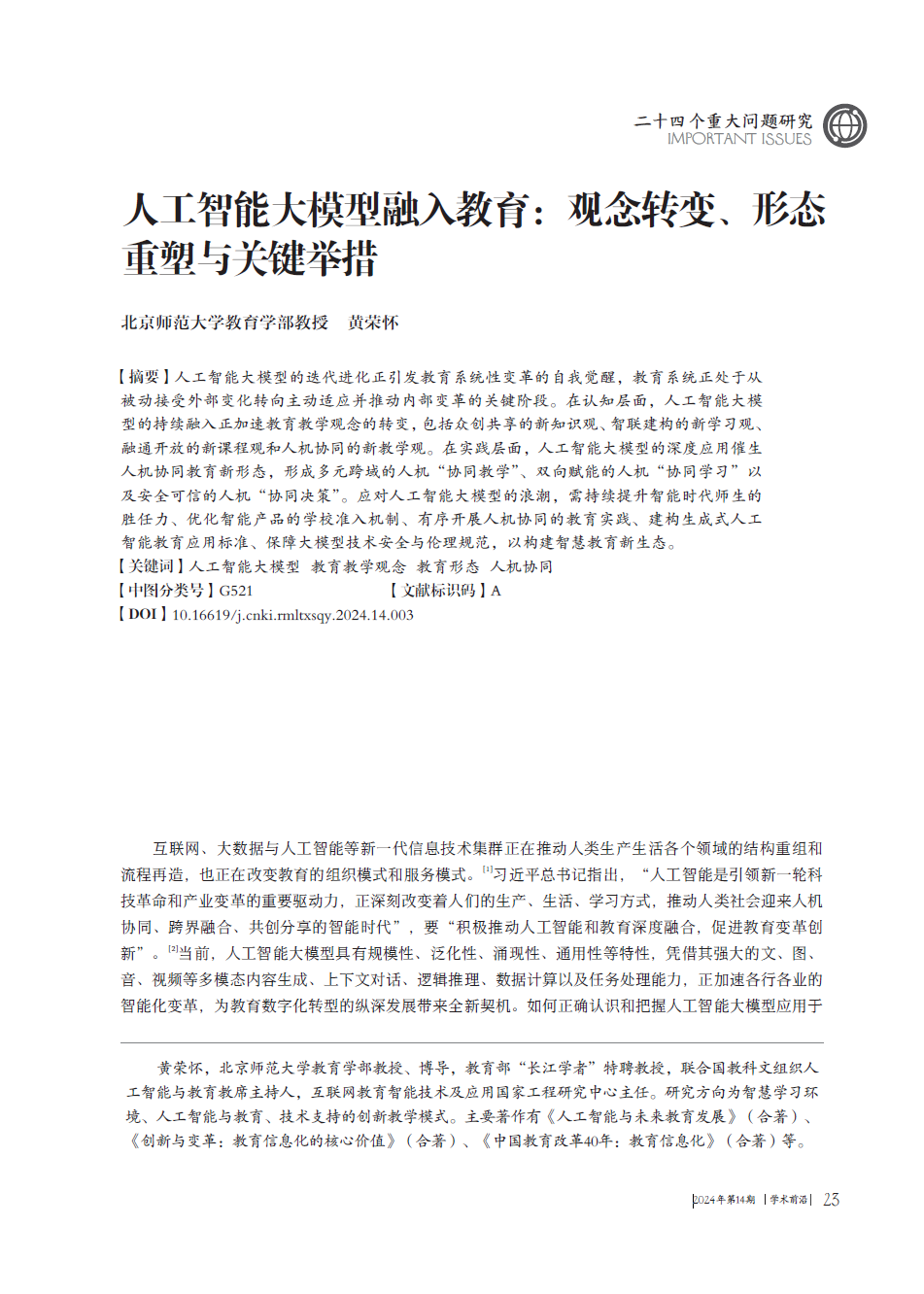
作者:黄荣怀,北京师范大学教育学部教授
来源:《学术前沿》杂志2024年第14期
相关阅读
黄荣怀|人工智能大模型融入教育:观念转变、形态重塑与关键举措
薛 贵,刘德建:脑认知科学和人工智能驱动的未来教育变革
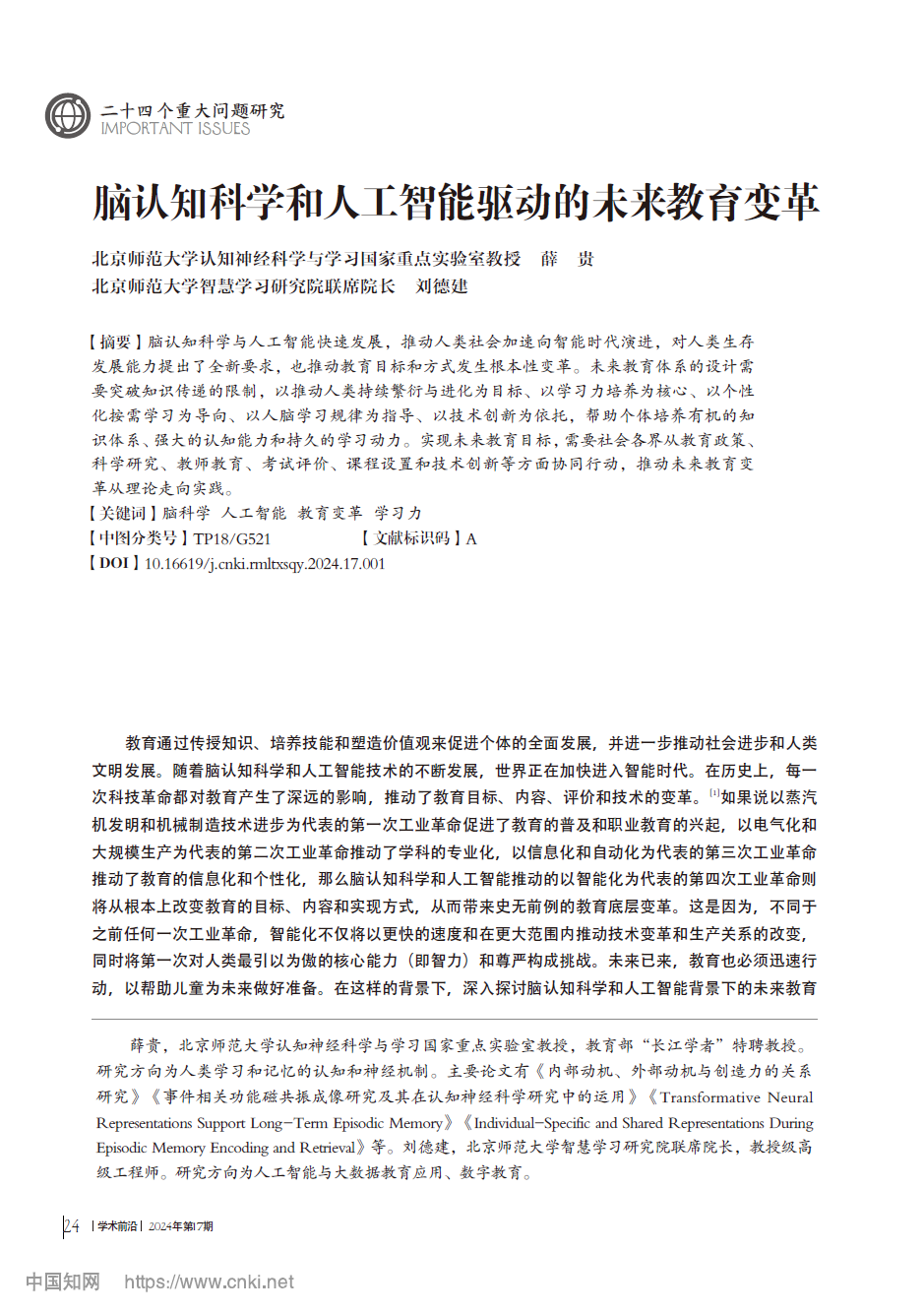
作者:薛贵,北京师范大学认知神经科学与学习国家重点实验室教授;刘德建,北京师范大学智慧学习研究院联席院长
来源:《学术前沿》杂志2024年第17期
相关阅读
薛贵,刘德建:脑认知科学和人工智能驱动的未来教育变革
刘德建:数字化如何推动职业院校教学改革
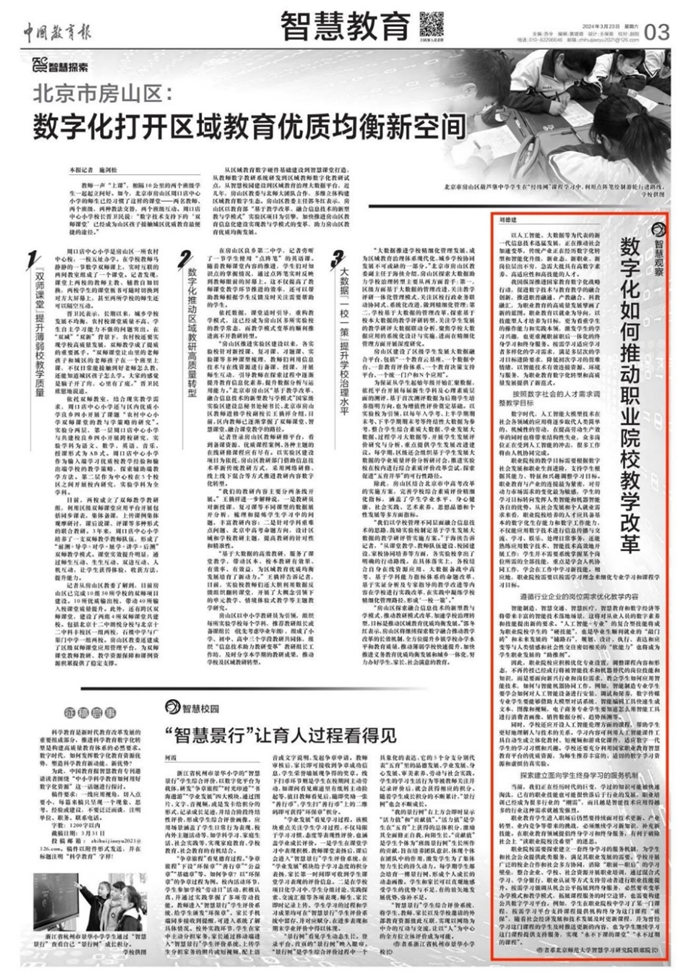
作者:刘德建,北京师范大学智慧学习研究院联席院长
来源:《中国教育报》2024年3月23日第03版
相关阅读
刘德建:数字化如何推动职业院校教学改革
黄荣怀:培养智能时代的关键能力,重塑高等教育
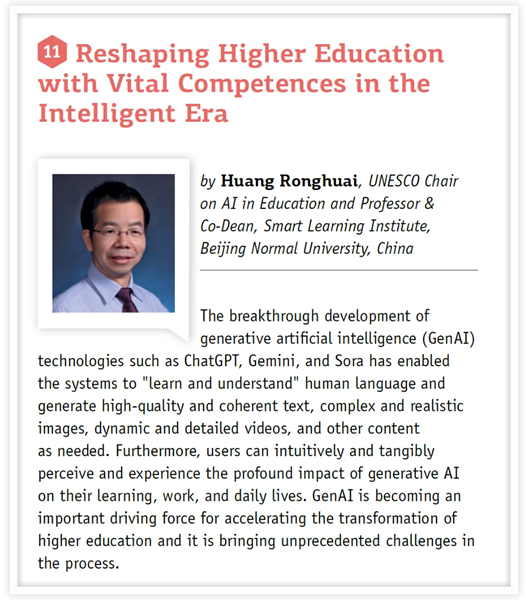
2024年5月,应国际大学联盟邀请,联合国教科文组织人工智能与教育教席主持人、北京师范大学智慧学习研究院联席院长黄荣怀教授在联盟会刊IAU Horizons发表题为《培养智能时代的关键能力,重塑高等教育》(“Reshaping Higher Education with Vital Competences in the Intelligent Era”)的英文署名文章。国际大学联盟(International Association of Universities - IAU)成立于1950年,是在联合国教科文组织支持下创立的全球高等教育机构和大学联盟领头组织。
相关阅读
黄荣怀教授在国际大学联盟会刊发文,展望智能时代学习者所需的关键能力
刘德建,曾海军:数字平台为新质学习生产力赋能
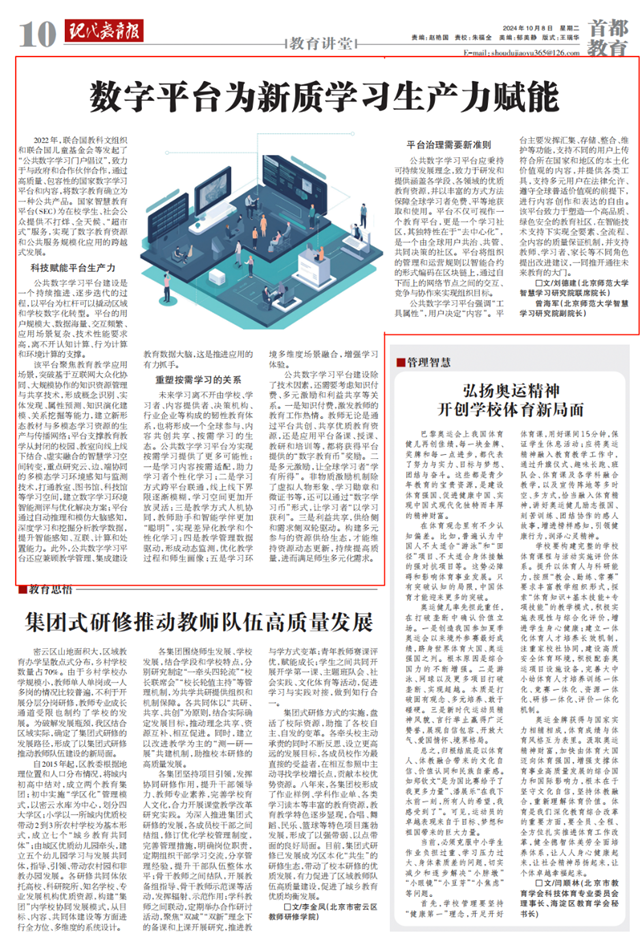
作者:刘德建,北京师范大学智慧学习研究院联席院长;曾海军,北京师范大学智慧学习研究院副院长
来源:《现代教育报》2024年10月8日第10版
相关阅读
刘德建,曾海军:数字平台为新质学习生产力赋能
黄荣怀:中国数字教育发展展望
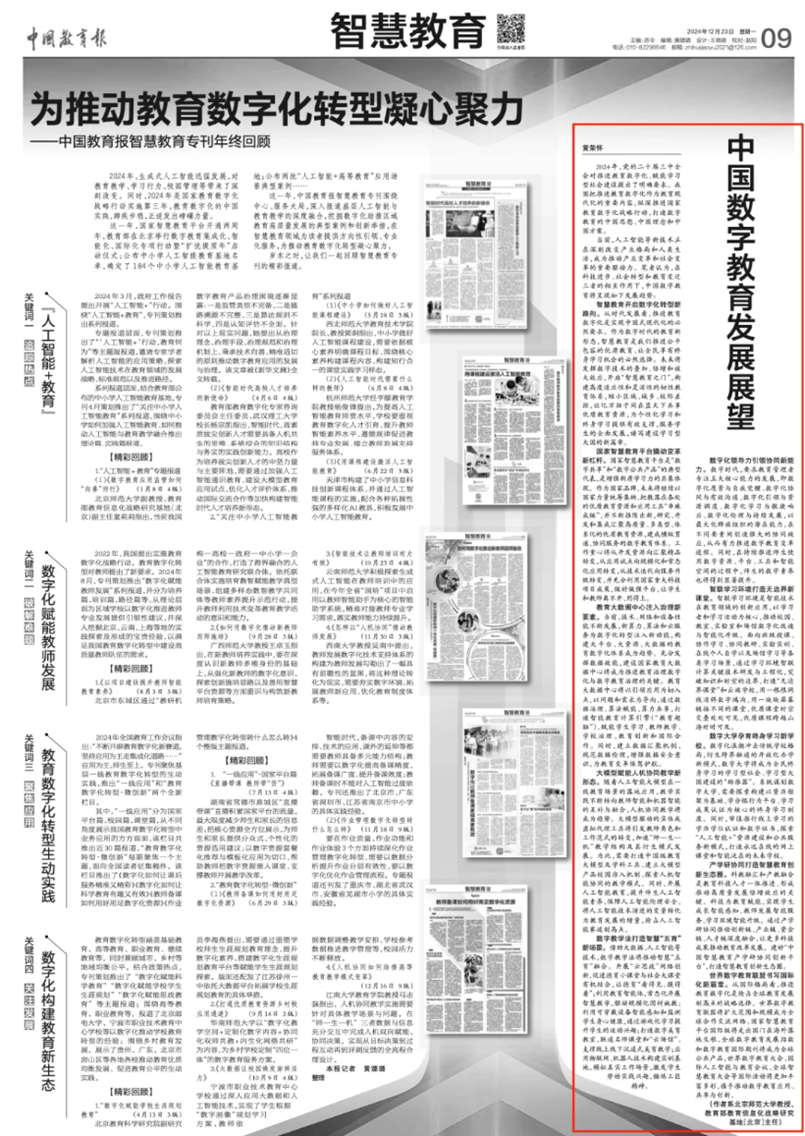
作者:黄荣怀,北京师范大学智慧学习研究院联席院长
来源:《中国教育报》2024年12月23日第09版
相关阅读
黄荣怀:中国数字教育发展十大展望

